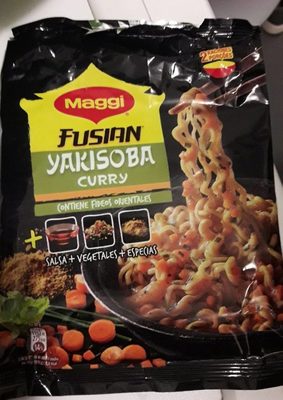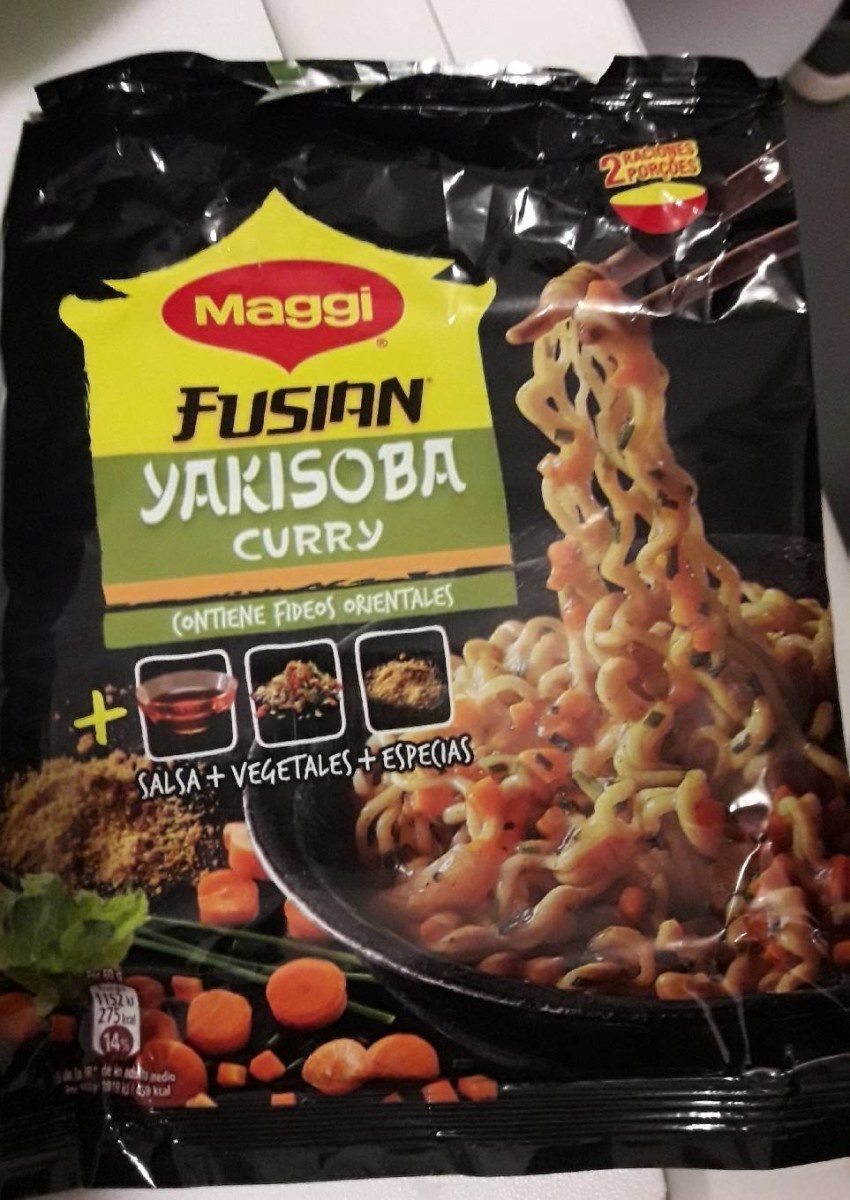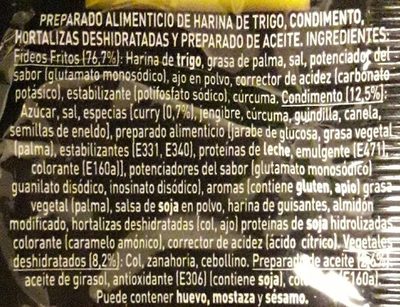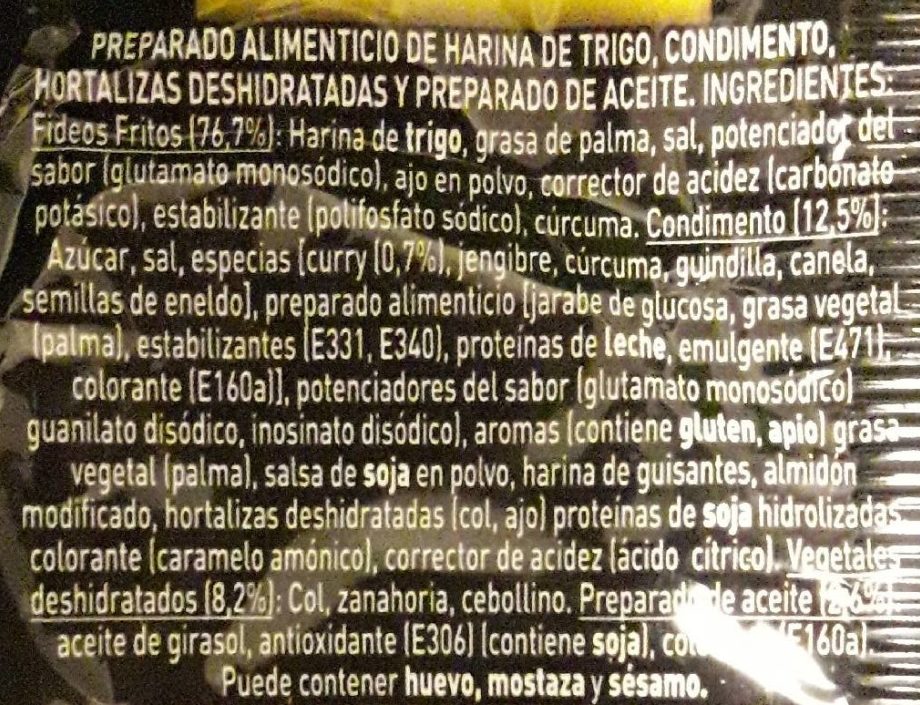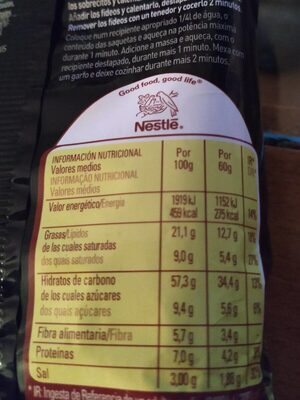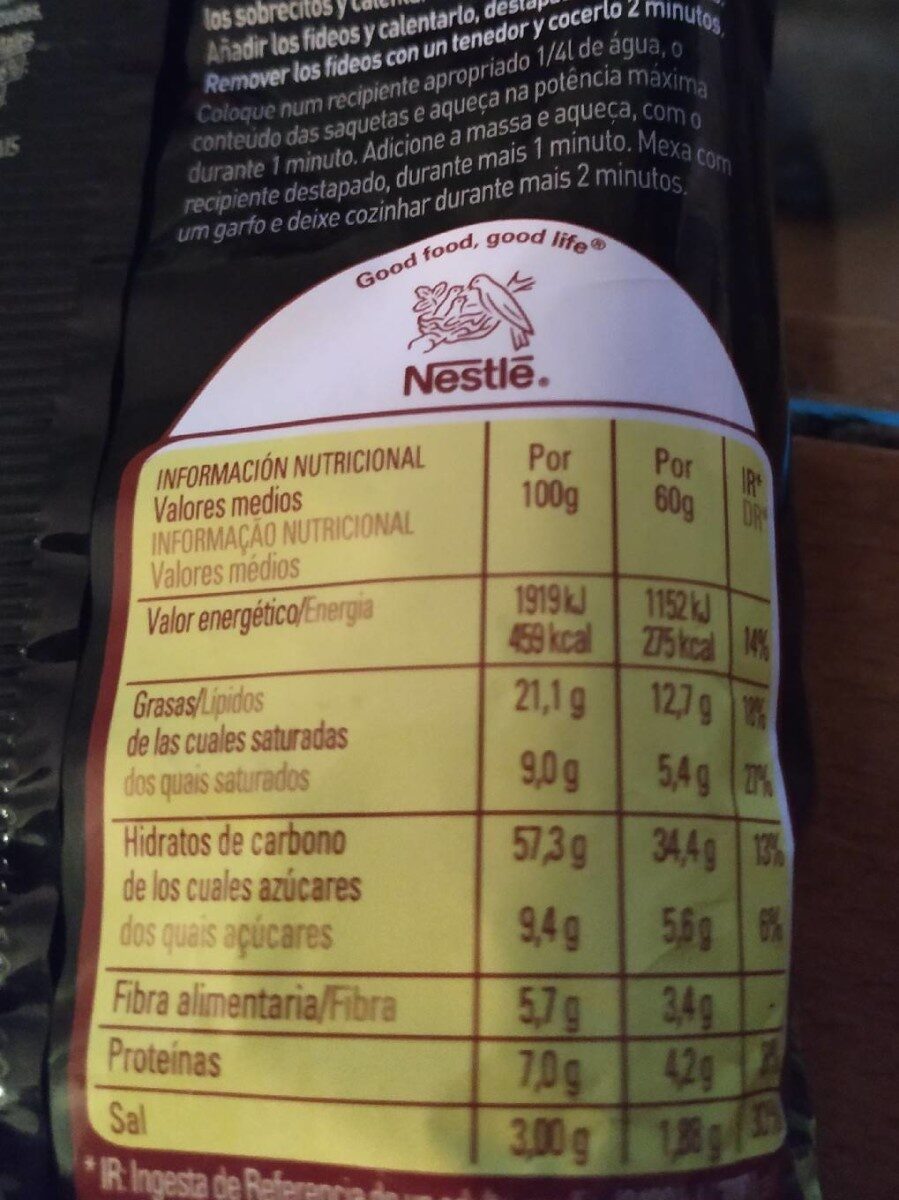Ajuda'ns a fer que la transparència alimentària sigui la norma!
Com a organització sense ànim de lucre, depenem de les vostres donacions per continuar informant els consumidors de tot el món sobre tot allò què mengen.
La revolució alimentària comença amb tu!
Fusian yakisoba fideos sabor curry - Maggi - 120 g
Fusian yakisoba fideos sabor curry - Maggi - 120 g
Aquesta pàgina del producte no està completa. Podeu ajudar a completar-la editant-la i afegint-hi més dades a partir de les fotos ja disponibles, o fent-ne més amb l'aplicació de androide o iPhone / iPad. Gràcies!
×
Codi de barres: 7613031923328 (EAN / EAN-13)
Quantitat: 120 g
Empaquetament: en:Bag
Marques: Maggi
Categories: Aliments i begudes amb base vegetal, Aliments amb base vegetal, Cereals i patates, Cereals i derivats, Productes secs, Pasta, Productes assecats per a ser rehidratats, Fideus, en:Instant noodles, Soba, en:Tagliatelle
Matching with your preferences
Salut
Ingredients
-
55 ingredients
: Fideos Fritos (76,7%): Harina de trigo, grasa de palma, sal, potenciador de sabor (glutamato monosódico), ajo en polvo, corrector de acidez (carbonato potásico, estabilizante (polifosfato sódico, cúrcuma. Condimento (12,5% Azúcar, sal, especias (curry (0,7%), jengibre, cúrcuma,guindilla, canela, semillas de eneldo, preparado alimenticio (jarabe de glucosa, grasa vegetal palma), estabilizantes (E331, E340), proteínas de leche, emulgente (E471, colorante (E160a), potenciadores del sabor glutamato monosódico, guanilato disódico, inosinato disódico, aromas (contiene gluten, apio) grasa vegetal (palma, salsa de soja en polvo, harina de guisantes, almidon modificado, hortalizas deshidratadas (col, ajo, proteinas de soja hidrolizadas, colorante (caramelo amónico), corrector de acidez (ácido cítrico). Vegetales deshidratados (8,2%: Col, zanahoria, cebollino.Al·lèrgens: en:Celery, en:Gluten, en:Milk, en:SoybeansRastres: en:Eggs, en:Mustard, en:Sesame seeds
Processament d'aliments
-
Aliments ultra processats
Elements que indiquen que el producte està al grup 4 - Aliments i begudes ultraprocessats:
- Additiu: E14XX - Midó modificat
- Additiu: E150c
- Additiu: E160a - Carotè
- Additiu: E452 - Polifosfat
- Additiu: E471 - Monoglicèrids i diglicèrids d'àcids grassos
- Additiu: E621 - Glutamat de monosodi
- Additiu: E627 - Guanilat de disodi
- Additiu: E631 - Inosinat de disodi
- Ingredient: Color
- Ingredient: Emulsionant
- Ingredient: Potenciador del gust
- Ingredient: Aromes
- Ingredient: Glucosa
- Ingredient: Xarop de glucosa
- Ingredient: Proteina de la llet
Els productes alimentaris es classifiquen en 4 grups segons el seu grau de processament:
- Aliments no processats o mínimament processats
- Ingredients culinaris processats
- Aliments processats
- Aliments ultra processats
La determinació del grup es fa en funció de la categoria del producte i dels ingredients que conté.
Additius
-
E160a - Carotè
Carotene: The term carotene -also carotin, from the Latin carota, "carrot"- is used for many related unsaturated hydrocarbon substances having the formula C40Hx, which are synthesized by plants but in general cannot be made by animals -with the exception of some aphids and spider mites which acquired the synthesizing genes from fungi-. Carotenes are photosynthetic pigments important for photosynthesis. Carotenes contain no oxygen atoms. They absorb ultraviolet, violet, and blue light and scatter orange or red light, and -in low concentrations- yellow light. Carotenes are responsible for the orange colour of the carrot, for which this class of chemicals is named, and for the colours of many other fruits, vegetables and fungi -for example, sweet potatoes, chanterelle and orange cantaloupe melon-. Carotenes are also responsible for the orange -but not all of the yellow- colours in dry foliage. They also -in lower concentrations- impart the yellow coloration to milk-fat and butter. Omnivorous animal species which are relatively poor converters of coloured dietary carotenoids to colourless retinoids have yellowed-coloured body fat, as a result of the carotenoid retention from the vegetable portion of their diet. The typical yellow-coloured fat of humans and chickens is a result of fat storage of carotenes from their diets. Carotenes contribute to photosynthesis by transmitting the light energy they absorb to chlorophyll. They also protect plant tissues by helping to absorb the energy from singlet oxygen, an excited form of the oxygen molecule O2 which is formed during photosynthesis. β-Carotene is composed of two retinyl groups, and is broken down in the mucosa of the human small intestine by β-carotene 15‚15'-monooxygenase to retinal, a form of vitamin A. β-Carotene can be stored in the liver and body fat and converted to retinal as needed, thus making it a form of vitamin A for humans and some other mammals. The carotenes α-carotene and γ-carotene, due to their single retinyl group -β-ionone ring-, also have some vitamin A activity -though less than β-carotene-, as does the xanthophyll carotenoid β-cryptoxanthin. All other carotenoids, including lycopene, have no beta-ring and thus no vitamin A activity -although they may have antioxidant activity and thus biological activity in other ways-. Animal species differ greatly in their ability to convert retinyl -beta-ionone- containing carotenoids to retinals. Carnivores in general are poor converters of dietary ionone-containing carotenoids. Pure carnivores such as ferrets lack β-carotene 15‚15'-monooxygenase and cannot convert any carotenoids to retinals at all -resulting in carotenes not being a form of vitamin A for this species-; while cats can convert a trace of β-carotene to retinol, although the amount is totally insufficient for meeting their daily retinol needs.Origen: Wikipedia (Anglès)
-
E330 - Acid citric
Citric acid: Citric acid is a weak organic acid that has the chemical formula C6H8O7. It occurs naturally in citrus fruits. In biochemistry, it is an intermediate in the citric acid cycle, which occurs in the metabolism of all aerobic organisms. More than a million tons of citric acid are manufactured every year. It is used widely as an acidifier, as a flavoring and chelating agent.A citrate is a derivative of citric acid; that is, the salts, esters, and the polyatomic anion found in solution. An example of the former, a salt is trisodium citrate; an ester is triethyl citrate. When part of a salt, the formula of the citrate ion is written as C6H5O3−7 or C3H5O-COO-3−3.Origen: Wikipedia (Anglès)
-
E331 - Citrats de sodi
Sodium citrate: Sodium citrate may refer to any of the sodium salts of citrate -though most commonly the third-: Monosodium citrate Disodium citrate Trisodium citrateThe three forms of the salt are collectively known by the E number E331. Sodium citrates are used as acidity regulators in food and drinks, and also as emulsifiers for oils. They enable cheeses to melt without becoming greasy.Origen: Wikipedia (Anglès)
-
E340 - Fosfat de potassi
Potassium phosphate: Potassium phosphate is a generic term for the salts of potassium and phosphate ions including: Monopotassium phosphate -KH2PO4- -Molar mass approx: 136 g/mol- Dipotassium phosphate -K2HPO4- -Molar mass approx: 174 g/mol- Tripotassium phosphate -K3PO4- -Molar mass approx: 212.27 g/mol-As food additives, potassium phosphates have the E number E340.Origen: Wikipedia (Anglès)
-
E471 - Monoglicèrids i diglicèrids d'àcids grassos
Mono- and diglycerides of fatty acids: Mono- and diglycerides of fatty acids -E471- refers to a food additive composed of diglycerides and monoglycerides which is used as an emulsifier. This mixture is also sometimes referred to as partial glycerides.Origen: Wikipedia (Anglès)
-
E501 - Carbonats de potassi
Potassium carbonate: Potassium carbonate -K2CO3- is a white salt, which is soluble in water -insoluble in ethanol- and forms a strongly alkaline solution. It can be made as the product of potassium hydroxide's absorbent reaction with carbon dioxide. It is deliquescent, often appearing a damp or wet solid. Potassium carbonate is used in the production of soap and glass.Origen: Wikipedia (Anglès)
-
E501i - Carbonat de potassi
Potassium carbonate: Potassium carbonate -K2CO3- is a white salt, which is soluble in water -insoluble in ethanol- and forms a strongly alkaline solution. It can be made as the product of potassium hydroxide's absorbent reaction with carbon dioxide. It is deliquescent, often appearing a damp or wet solid. Potassium carbonate is used in the production of soap and glass.Origen: Wikipedia (Anglès)
-
E621 - Glutamat de monosodi
Monosodium glutamate: Monosodium glutamate -MSG, also known as sodium glutamate- is the sodium salt of glutamic acid, one of the most abundant naturally occurring non-essential amino acids. Glutamic acid is found naturally in tomatoes, grapes, cheese, mushrooms and other foods.MSG is used in the food industry as a flavor enhancer with an umami taste that intensifies the meaty, savory flavor of food, as naturally occurring glutamate does in foods such as stews and meat soups. It was first prepared in 1908 by Japanese biochemist Kikunae Ikeda, who was trying to isolate and duplicate the savory taste of kombu, an edible seaweed used as a base for many Japanese soups. MSG as a flavor enhancer balances, blends, and rounds the perception of other tastes.The U.S. Food and Drug Administration has given MSG its generally recognized as safe -GRAS- designation. A popular belief is that large doses of MSG can cause headaches and other feelings of discomfort, known as "Chinese restaurant syndrome," but double-blind tests fail to find evidence of such a reaction. The European Union classifies it as a food additive permitted in certain foods and subject to quantitative limits. MSG has the HS code 29224220 and the E number E621.Origen: Wikipedia (Anglès)
-
E627 - Guanilat de disodi
Disodium guanylate: Disodium guanylate, also known as sodium 5'-guanylate and disodium 5'-guanylate, is a natural sodium salt of the flavor enhancing nucleotide guanosine monophosphate -GMP-. Disodium guanylate is a food additive with the E number E627. It is commonly used in conjunction with glutamic acid. As it is a fairly expensive additive, it is not used independently of glutamic acid; if disodium guanylate is present in a list of ingredients but MSG does not appear to be, it is likely that glutamic acid is provided as part of another ingredient such as a processed soy protein complex. It is often added to foods in conjunction with disodium inosinate; the combination is known as disodium 5'-ribonucleotides. Disodium guanylate is produced from dried seaweed and is often added to instant noodles, potato chips and other snacks, savory rice, tinned vegetables, cured meats, and packaged soup.Origen: Wikipedia (Anglès)
-
E631 - Inosinat de disodi
Disodium inosinate: Disodium inosinate -E631- is the disodium salt of inosinic acid with the chemical formula C10H11N4Na2O8P. It is used as a food additive and often found in instant noodles, potato chips, and a variety of other snacks. Although it can be obtained from bacterial fermentation of sugars, it is often commercially prepared from animal sources.Origen: Wikipedia (Anglès)
Anàlisi dels ingredients
-
Oli de palma
Ingredients que contenen oli de palma: Greix de palma, Greix de palma, en:Palm
-
No és vegà
Ingredients no vegans: Proteina de la lletAlguns ingredients no s'han pogut reconèixer.
Necessitem la teva ajuda!
Podeu ajudar-nos a reconèixer més ingredients i analitzar millor la llista d'ingredients d'aquest producte i d'altres mitjançant:
- Editeu aquesta pàgina de producte per corregir les faltes d’ortografia de la llista d’ingredients i/o per eliminar els ingredients d’altres idiomes i frases que no estiguin relacionades amb els ingredients.
- Afegiu entrades, sinònims o traduccions noves a les nostres llistes multilingües d’ingredients, mètodes de processament d’ingredients i etiquetes.
Uniu-vos al canal #ingredients del nostre espai de discussió a Slack i/o apreneu sobre l'anàlisi dels ingredients en la nostra wiki, si voleu ajudar. Gràcies!
-
Es desconeix si és vegetarià
Ingredients no reconeguts: es:preparado-alimenticioAlguns ingredients no s'han pogut reconèixer.
Necessitem la teva ajuda!
Podeu ajudar-nos a reconèixer més ingredients i analitzar millor la llista d'ingredients d'aquest producte i d'altres mitjançant:
- Editeu aquesta pàgina de producte per corregir les faltes d’ortografia de la llista d’ingredients i/o per eliminar els ingredients d’altres idiomes i frases que no estiguin relacionades amb els ingredients.
- Afegiu entrades, sinònims o traduccions noves a les nostres llistes multilingües d’ingredients, mètodes de processament d’ingredients i etiquetes.
Uniu-vos al canal #ingredients del nostre espai de discussió a Slack i/o apreneu sobre l'anàlisi dels ingredients en la nostra wiki, si voleu ajudar. Gràcies!
-
Detalls de l'anàlisi dels ingredients
Necessitem la teva ajuda!
Alguns ingredients no s'han pogut reconèixer.
Necessitem la teva ajuda!
Podeu ajudar-nos a reconèixer més ingredients i analitzar millor la llista d'ingredients d'aquest producte i d'altres mitjançant:
- Editeu aquesta pàgina de producte per corregir les faltes d’ortografia de la llista d’ingredients i/o per eliminar els ingredients d’altres idiomes i frases que no estiguin relacionades amb els ingredients.
- Afegiu entrades, sinònims o traduccions noves a les nostres llistes multilingües d’ingredients, mètodes de processament d’ingredients i etiquetes.
Uniu-vos al canal #ingredients del nostre espai de discussió a Slack i/o apreneu sobre l'anàlisi dels ingredients en la nostra wiki, si voleu ajudar. Gràcies!
: Fideos 76.7% (Harina de trigo), grasa de palma, sal, potenciador de sabor (glutamato monosódico), ajo, corrector de acidez, carbonato potásico, estabilizante, polifosfato sódico, cúrcuma, Condimento, Azúcar 12.5%, sal, especias, curry 0.7%, jengibre, cúrcuma, guindilla, canela, semillas de eneldo, preparado alimenticio (jarabe de glucosa, grasa vegetal palma), estabilizantes (e331, e340), proteínas de leche, emulgente, e471, colorante (e160a), potenciadores del sabor (glutamato monosódico), guanilato disódico, inosinato disódico, aromas (), grasa vegetal, palma, salsa de soja, harina de guisantes, almidon modificado, hortalizas, col, ajo, proteinas de soja hidrolizadas, colorante (caramelo amónico), corrector de acidez (ácido cítrico), Vegetales 8.2%, Col, zanahoria, cebollino- Fideos -> en:noodle - vegan: maybe - vegetarian: maybe - percent: 76.7
- Harina de trigo -> en:wheat-flour - vegan: yes - vegetarian: yes - ciqual_proxy_food_code: 9410
- grasa de palma -> en:palm-fat - vegan: yes - vegetarian: yes - from_palm_oil: yes - ciqual_proxy_food_code: 16129
- sal -> en:salt - vegan: yes - vegetarian: yes - ciqual_food_code: 11058
- potenciador de sabor -> en:flavour-enhancer
- glutamato monosódico -> en:e621 - vegan: yes - vegetarian: yes
- ajo -> en:garlic - vegan: yes - vegetarian: yes - ciqual_food_code: 11000
- corrector de acidez -> en:acidity-regulator
- carbonato potásico -> en:e501i - vegan: yes - vegetarian: yes
- estabilizante -> en:stabiliser
- polifosfato sódico -> en:e452i - vegan: yes - vegetarian: yes
- cúrcuma -> en:turmeric - vegan: yes - vegetarian: yes - ciqual_proxy_food_code: 11089
- Condimento -> en:condiment - vegan: maybe - vegetarian: maybe
- Azúcar -> en:sugar - vegan: yes - vegetarian: yes - ciqual_proxy_food_code: 31016 - percent: 12.5
- sal -> en:salt - vegan: yes - vegetarian: yes - ciqual_food_code: 11058
- especias -> en:spice - vegan: yes - vegetarian: yes
- curry -> en:curry - vegan: yes - vegetarian: yes - ciqual_food_code: 11005 - percent: 0.7
- jengibre -> en:ginger - vegan: yes - vegetarian: yes - ciqual_food_code: 11074
- cúrcuma -> en:turmeric - vegan: yes - vegetarian: yes - ciqual_proxy_food_code: 11089
- guindilla -> en:chili-pepper - vegan: yes - vegetarian: yes - ciqual_food_code: 20151
- canela -> en:cinnamon - vegan: yes - vegetarian: yes
- semillas de eneldo -> en:dill-seed - vegan: yes - vegetarian: yes - ciqual_food_code: 11093
- preparado alimenticio -> es:preparado-alimenticio
- jarabe de glucosa -> en:glucose-syrup - vegan: yes - vegetarian: yes - ciqual_proxy_food_code: 31016
- grasa vegetal palma -> en:palm-fat - vegan: yes - vegetarian: yes - from_palm_oil: yes - ciqual_proxy_food_code: 16129
- estabilizantes -> en:stabiliser
- e331 -> en:e331 - vegan: yes - vegetarian: yes
- e340 -> en:e340 - vegan: yes - vegetarian: yes
- proteínas de leche -> en:milk-proteins - vegan: no - vegetarian: yes
- emulgente -> en:emulsifier
- e471 -> en:e471 - vegan: maybe - vegetarian: maybe - from_palm_oil: maybe
- colorante -> en:colour
- e160a -> en:e160a - vegan: maybe - vegetarian: maybe - from_palm_oil: maybe
- potenciadores del sabor -> en:flavour-enhancer
- glutamato monosódico -> en:e621 - vegan: yes - vegetarian: yes
- guanilato disódico -> en:e627 - vegan: maybe - vegetarian: maybe
- inosinato disódico -> en:e631 - vegan: maybe - vegetarian: maybe
- aromas -> en:flavouring - vegan: maybe - vegetarian: maybe
- grasa vegetal -> en:vegetable-fat - vegan: yes - vegetarian: yes - from_palm_oil: maybe
- palma -> en:palm - vegan: yes - vegetarian: yes - from_palm_oil: yes - ciqual_food_code: 16129
- salsa de soja -> en:soy-sauce - vegan: maybe - vegetarian: maybe - ciqual_food_code: 11104
- harina de guisantes -> en:pea-flour - vegan: yes - vegetarian: yes - ciqual_proxy_food_code: 9410
- almidon modificado -> en:modified-starch - vegan: yes - vegetarian: yes - ciqual_proxy_food_code: 9510
- hortalizas -> en:vegetable - vegan: yes - vegetarian: yes
- col -> en:cabbage - vegan: yes - vegetarian: yes
- ajo -> en:garlic - vegan: yes - vegetarian: yes - ciqual_food_code: 11000
- proteinas de soja hidrolizadas -> en:hydrolysed-soy-protein - vegan: yes - vegetarian: yes - ciqual_food_code: 20591
- colorante -> en:colour
- caramelo amónico -> en:e150a - vegan: yes - vegetarian: yes
- corrector de acidez -> en:acidity-regulator
- ácido cítrico -> en:e330 - vegan: yes - vegetarian: yes
- Vegetales -> en:vegetable - vegan: yes - vegetarian: yes - percent: 8.2
- Col -> en:cabbage - vegan: yes - vegetarian: yes
- zanahoria -> en:carrot - vegan: yes - vegetarian: yes - ciqual_food_code: 20009
- cebollino -> en:chives - vegan: yes - vegetarian: yes - ciqual_food_code: 11003
-
Informació nutricional
Informació nutricional Com es ven
per 100 g/100 mlComparat amb: en:Tagliatelle Energia 1.121 kj
(268 kcal)-10% Greix 10,6 g +109% Àcid gras saturat 5,1 g +202% Hidrats de carboni 35 g -29% Sucre 5,7 g +226% Fiber 5,7 g +101% Proteïna 6,4 g -17% Sal comuna 1,76 g +64% Fruits‚ vegetables‚ nuts and rapeseed‚ walnut and olive oils (estimate from ingredients list analysis) 8,2 %
Entorn
-
Eco-puntuació C - Impacte ambiental moderat
El Eco-Score és una puntuació experimental que resumeix els impactes ambientals dels productes alimentaris.→ L'Eco-Score es va desenvolupar inicialment a França i s'està ampliant per a altres països europeus. La fórmula Eco-Score està subjecta a canvis, ja que es millora periòdicament per fer-la més precisa i més adequada per a cada país.Anàlisi del cicle de vida
-
Impacte mitjà dels productes de la mateixa categoria: A (Score: 82/100)
Categoria: Asian noodles, flavoured, dehydrated
Categoria: Asian noodles, flavoured, dehydrated
- Puntuació ambiental PEF ( petjada ambiental de l'aliment ): 0.26 (com més baixa sigui la puntuació, menor serà l'impacte)
- incloent l'impacte sobre el canvi climàtic: 1.67 kg CO₂ eq/kg del producte
Etapa Impacte Agricultura
65.5 %Processament
20.6 %Empaquetament
8.7 %Transport
3.5 %Distribució
1.8 %Consum
0.0 %
Bonificacions i punts negatius
-
Falta informació sobre l'origen dels ingredients
Punts negatius: -5
⚠ ️ L'origen dels ingredients d'aquest producte no està indicat.
Si estan indicats a l'embalatge, podeu modificar la fitxa del producte i afegir-los.
Si sou el fabricant d'aquest producte, podeu enviar-nos la informació amb la nostra plataforma gratuïta per a productors.
-
Ingredients que amenacen les espècies
Punts negatius: -10
Conté oli de palma
Els boscos tropicals d'Àsia, Àfrica i Amèrica Llatina es destrueixen per crear i ampliar les plantacions de palmera d'oli. La desforestació contribueix al canvi climàtic, i posa en perill espècies com l'orangutan, l'elefant pigmeu i el rinoceront de Sumatra.
-
Embalatge d'impacte mitjà
Punts negatius: -10
Forma Material Reciclatge Impacte Bag Unknown Alt ⚠ ️ La informació sobre l'embalatge d'aquest producte no és prou precisa (formes i materials exactes de tots els components de l'embalatge).⚠ ️ Per a un càlcul més precís de l'Eco-Score, podeu modificar la pàgina del producte i afegir-los.
Si sou el fabricant d'aquest producte, podeu enviar-nos la informació amb la nostra plataforma gratuïta per a productors.
Eco-Score per a aquest producte
-
Impacte per a aquest producte: C (Score: 57/100)
Producte: Fusian yakisoba fideos sabor curry - Maggi - 120 g
Puntuació de l'anàlisi del cicle de vida: 82
Suma de bonificacions i punts negatius: -25
Puntuació final: 57/100
-
Petjada de carboni
-
Equivalent a conduir 0.9 km en un cotxe de gasolina
167 g de CO² per cada 100 g de producte
La xifra d'emissions de carboni prové de la base de dades Agribalyse d'ADEME, per a la categoria: Asian noodles, flavoured, dehydrated (Font: Base de dades ADEME Agribalyse)
Etapa Impacte Agricultura
61.0 %Processament
14.9 %Empaquetament
16.3 %Transport
6.8 %Distribució
1.0 %Consum
0.0 %
Empaquetament
-
Embalatge d'impacte mitjà
-
Materials d'embalatge
Material % Pes de l'embalatge Pes de l'embalatge per 100 g de producte
-
Transport
-
Orígens dels ingredients
Falta informació sobre l'origen dels ingredients
⚠ ️ L'origen dels ingredients d'aquest producte no està indicat.
Si estan indicats a l'embalatge, podeu modificar la fitxa del producte i afegir-los.
Si sou el fabricant d'aquest producte, podeu enviar-nos la informació amb la nostra plataforma gratuïta per a productors.Add the origins of ingredients for this product Add the origins of ingredients for this product
Espècies amenaçades
-
Conté oli de palma
Fomenta la desforestació i amenaça espècies com l'orangutan
Els boscos tropicals d'Àsia, Àfrica i Amèrica Llatina es destrueixen per crear i ampliar les plantacions de palmera d'oli. La desforestació contribueix al canvi climàtic, i posa en perill espècies com l'orangutan, l'elefant pigmeu i el rinoceront de Sumatra.
Report a problem
-
Incomplete or incorrect information?
Category, labels, ingredients, allergens, nutritional information, photos etc.
If the information does not match the information on the packaging, please complete or correct it. Open Food Facts is a collaborative database, and every contribution is useful for all.
Fonts de dades
Producte afegit per kiliweb
Última modificació de la pàgina del producte per naruyoko.
La pàgina del producte, també editada per acuario, autorotate-bot, date-limite-app, elcoco, musarana, openfoodfacts-contributors, packbot, roboto-app, saisa, yuka.UzZNYVNxSVpvZmtLd2ZZZTFTSFdvOTFzNHNHVVZIcXRFdEVPSVE9PQ, yuka.V3JGUVRvZ252dE1WcE1VRDBCZUozODVQeUxLNGQwNk1BT2tZSVE9PQ, yuka.WFlSWU1LSTRuUFF6cHZJOG9ocm9xK2hNeTc2Z1FsR3hHZFpNSUE9PQ.
